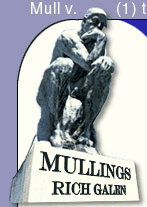|
|

|


State of the State of the Union
Rich Galen
Monday February 11, 2013
 Twitter Twitter
Click here for an Easy Print Version
From Paris, France
I am in Paris for one afternoon and overnight because the non-stop service from Oujda, Morocco to Dulles International Airport just outside Washington, DC hasn't yet begun.
We flew into Orly Airport which is the Newark Airport of Europe. If you can arrange a trip that doesn't include Orly, I recommend you do that.
But, any story that ends with, "and then we had dinner in Paris" is a pretty good story.
Washington, DC is awash in activity surrounding the President's State of the Union address tomorrow night at nine Eastern time
As we have discussed before, every association, DC-based government affairs office, lobbying shop, law firm, union, and coalition is working like the devil to get its client's issue mentioned in the President's remarks.
The State of the Union address is, like so much of what goes on in Our Nation's Capital, based upon the U.S. Constitution which says in Article II, section 3 that the President
"shall from time to time give to the Congress Information of the State of the Union, and recommend to their Consideration such Measures as he shall judge necessary and expedient ..."
I keep telling you that the Constitution is the Official Rule Book of Washington, and that is but one more example.
SIDEBAR
Later in that section, these words, "he shall take care that the laws be faithfully executed," appear. Before this second term is over (and we're only 22 days into it) that clause will become very important in deciding the limits of Executive power to decide which law shall be enforced and which may be ignored.
END SIDEBAR
According to the official webpage of the U.S. House of Representatives, the State of the Union Address wasn't called that until 1942. Prior to that (starting in 1790) it was known as the "Annual Message" even though the Constitution only requires the President to report "from time to time."
According to the Congressional Research Service (CRS), both George Washington and his successor John Adams delivered their remarks in person, but
"President Jefferson abandoned the practice as "monarchical" and time consuming, sending written messages instead.
This precedent was followed until President Wilson personally appeared before Congress in 1913. President Franklin Roosevelt adopted Wilson's practice of personal delivery, and it has since become a contemporary tradition.
In the earliest days the "Annual Message" was more like a Chairman's report to the Board and included details about what the Departments and Agencies had spent and what funding they needed. The CRS reports that rather than having a representative of the opposite party deliver the response,
"Each house subsequently debated and approved official replies to the President's message, which were then delivered personally to the President by delegations of Senators and Representatives."
It is well known that one Cabinet Secretary is absent from the Capitol on State of the Union night to make certain at least one person in line of succession to the Presidency is not in the building. The order is generally the date that a Cabinet office was created so the Secretary of State is first (after VP, the Speaker of the House, and President Pro Tempore of the Senate) and the head of the newest Department, Secretary of Homeland Security is at the bottom of the list at 18th in line.
There has been talk of shuffling the order to more closely reflect the activities of the Departments like moving Homeland Security to just behind the Attorney General in 8th place ahead of Education, Agriculture, Interior, VA, etc., but old habits die hard and it hasn't gotten anywhere.
Since shortly after 9/11, the House and Senate have each sent a member of each party to an undisclosed location to assure continuation of those two chambers as well.
This last bit makes for some strange bedfellows. In 2006, for instance, Republican Eric Cantor (R-VA) and Democrat George Miller (D-CA) were selected to absent themselves from the Capitol Building.
I would pay good money to hear the conversation in the bunker between those two.
In the end the only two people who know the exact contents of the State of the Union address are the President and the aide who types the final edits into the Teleprompter.
The rest of Washington's most important people have to wait, just like you and me, to hear what he says.
On the Secret Decoder Ring page today: Links to the full text of Article II, section 3; to the House of Reps web page, to the CRS briefing and to the Wikipedia entry for who is where in the line of succession to the Presidency.
Also a very cool Mullfoto from out my hotel window last night.
-- END --
Copyright © 2013 Barrington Worldwide, LLC
Become a
Paid Mullings Subscriber!
(To join the FREE mailing list or to unsubscribe Click Here)

Current Issue |
Secret Decoder
Ring | Past
Issues | Email
Rich | Rich
Who?
Copyright �2013 Barrington Worldwide, LLC | Site design by Campaign
Solutions. | |
|



